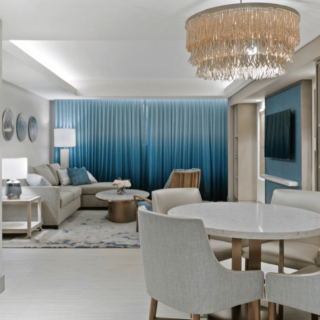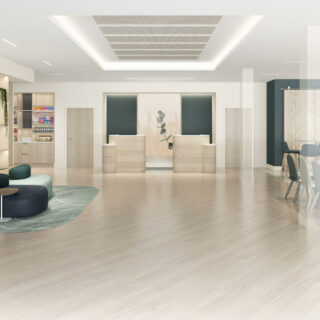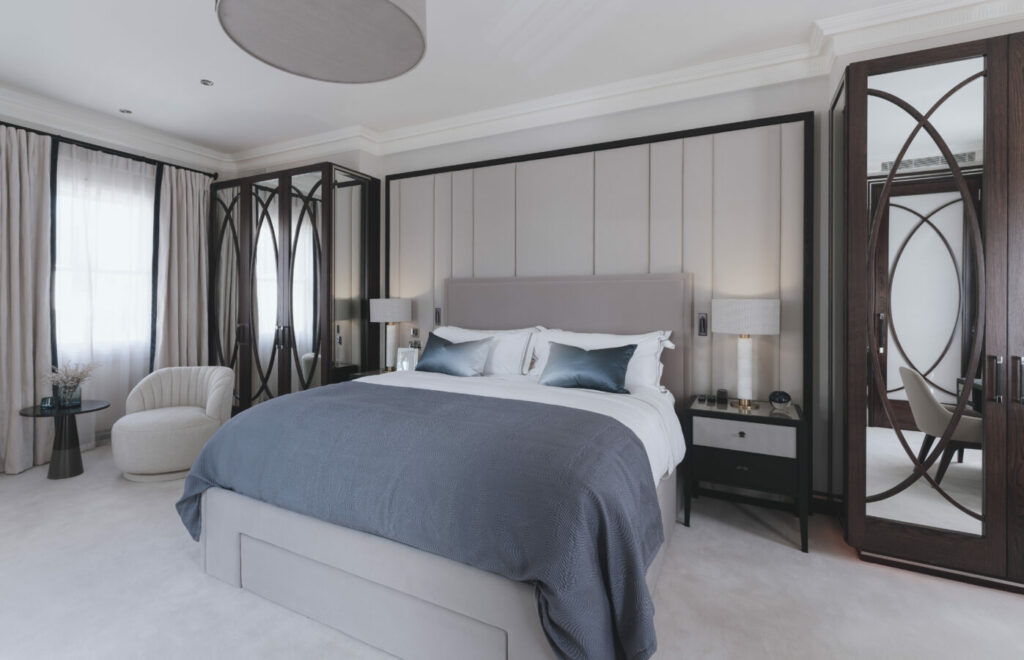
In 2016 the Kingdom of Saudi Arabia launched an ambitious framework to diversify its economy, reduce its dependency on oil and introduce a new era of opportunities for its citizens. Integral to this blueprint is the transformation of the Kingdom’s hotel, leisure & hospitality sectors through a series of visionary projects and initiatives including the world famous giga-projects.
Entering 2024, these hospitality plans are being realised at pace. As luxury resorts emerge along the Red Sea coastline, world-class hotels are taking shape in urban centres, and historic religious sites are being reimagined as tourist destinations. Over the next seven years, Saudi Arabia is poised to continue this impressive trajectory, with plans to expand its hospitality offerings, including the development of eco-friendly hotels, the enhancement of cultural heritage sites, and the construction of futuristic cities like NEOM, The Red Sea and Amaala that promise to revolutionize the concept of leisure and business travel.
This expansive growth is a testament to the Kingdom’s commitment to Vision 2030. It also spotlights the critical role that well-considered hotel FF&E and OS&E procurement strategies have in sculpting the future of Saudi’s ambitious plans. Additionally, it highlights the delicate balance required between local and international sourcing options to successfully deliver the many projects coming online in the next few years.
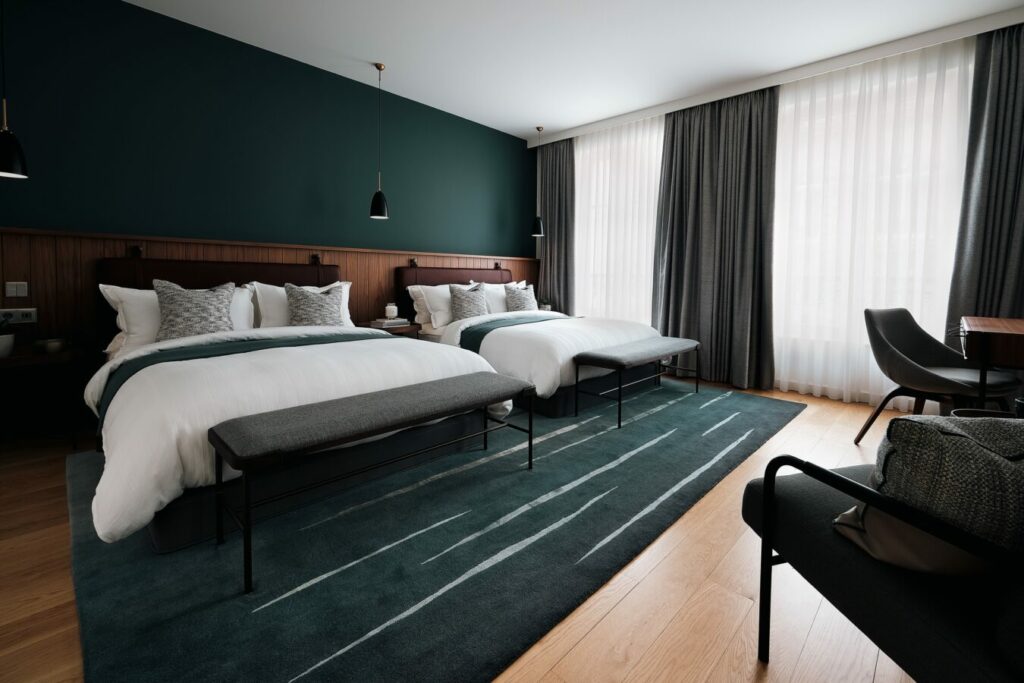
In this blog post, we’re answering 7 of the most frequently asked questions we receive around FF&E and hotel procurement specific to Saudi Arabia. In answering the questions, we’ll also explore the intricacies of why a mix of local Saudi & global international talent is essential in solving the unique opportunities and complex challenges of FF&E procurement in the region.
1. What is FF&E and why is it important?
FF&E stands for Furniture, Fixtures, and Equipment, the movable furniture, fixtures, or other equipment that have no permanent connection to the structure of a building. FF&E is crucial to successful hospitality projects, as it directly affects the operations, aesthetics, functionality, comfort, and overall guest experience within a hotel or hospitality establishment. Great FF&E can enhance the atmosphere of a hotel or restaurant, ensuring guests have a memorable stay – both essential in generating repeat business and strong guest reviews, while contributing to a positive ROI for hotel investors.
2. What is a hotel FF&E and OS&E procurement strategy?
A hotel FF&E and OS&E procurement strategy is a framework or plan that outlines all the activities & roles required to deliver all the furniture, fittings & equipment necessary for a hotel project, within a specified budget and time-frame. Starting with a review and understanding of the project’s scope, finances, design vision and quality standards, the strategy culminates in a delivery schedule and installation plan.
It takes into account the detailed specifications & suppliers of all the furniture, fixtures and equipment selected by the Interior Designers on the project. These specifications will address the client brief and the overall design concept of the hotel, while considering local climate and customs and ensuring that materials and designs are suitable for the region’s unique environmental and cultural expectations.
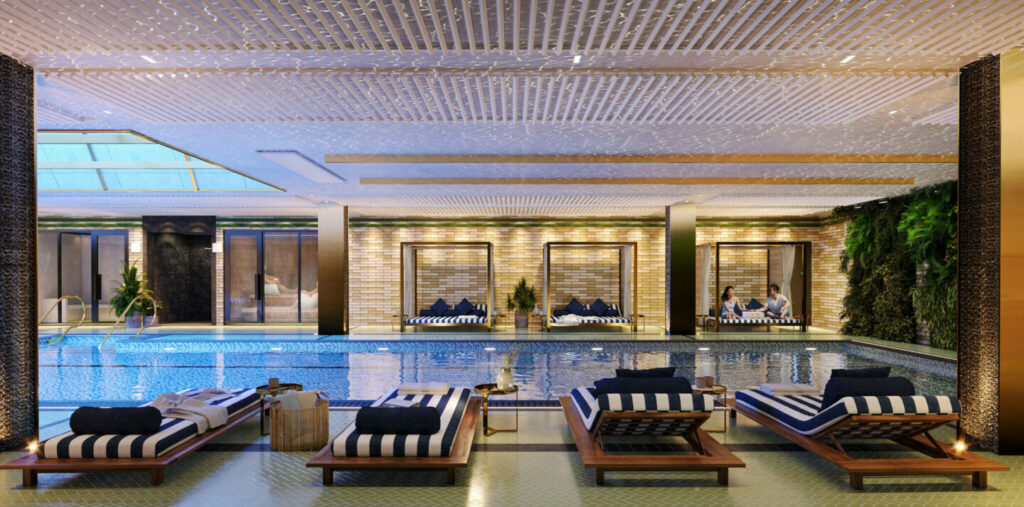
3. How is the FF&E market in Saudi Arabia evolving?
Since 2016 the FF&E market in Saudi Arabia has undergone a seismic transformation, largely driven by the ambitious Vision 2030 plan and the sheer volume of hospitality projects under construction over the past 7 years and planned for the coming 7 years.
The development and scale of diverse projects such as new resorts like Amaala Triple Bay combined with city developments like Diriyah Gate, is creating a significant demand for high-quality and culturally appropriate FF&E in the region. Rather than immediately sourcing global products, local manufacturers are increasingly more involved in projects, and there’s a growing interest in sustainable and locally sourced materials, reflecting global trends and environmental consciousness.
Saudization has also changed the FF&E landscape in the region as more nationals are now involved in a wider range of private-sector businesses including hospitality, manufacturing and design.
4. What are the compliance requirements for FF&E procurement in Saudi Arabia?
As in many regions, hotel FF&E procurement is largely governed by global hotel brand standards and / or local regulations, whichever is more onerous.
In Saudi, SASO is the technical governing body that manages SABER, the comprehensive electronic Certificate of Conformity system for goods imported to Saudi Arabia.
Saudi also has a Product Safety program called SALEEM, which was developed to regulate the region’s quality and safety requirements and ensure that all imported products comply with these regulations too. SALEEM is an approval that indicates that the product is safe, secure and free of flaws that may directly or indirectly harm individuals, society or the environment.
All products being shipped to Saudi Arabia must also be accompanied by a mandatory Shipment Certificate of Conformity [SCOC] without one, products are refused at their destination.
While rigorous, the Saudi compliance requirements and regulations surrounding the supply and or import of FF&E in the region are not too dissimilar to the requirements of other countries. Saudi Arabia adheres to the WTO Customs Valuation Agreement which sets out methods for the determination of customs valuation.
Imports to Saudi are subject to a customs surcharge, port fees, cargo service fees, and an import inspection tax and it is often advisable to work with local certified agent to avoid any pitfalls.
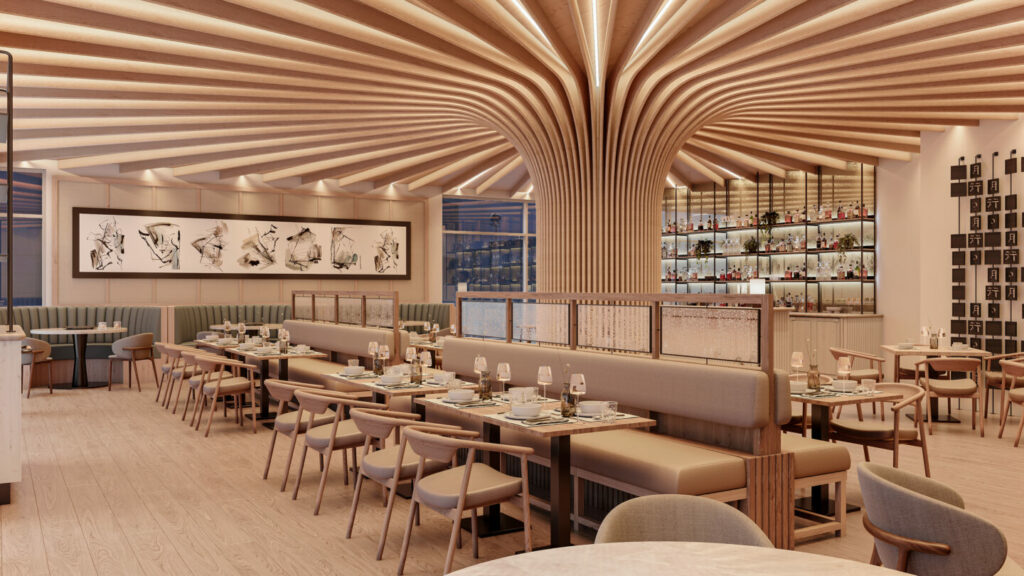
5. What are the local sourcing options for FF&E in Saudi Arabia, and how do they compare with international sourcing?
Local sourcing options for FF&E in Saudi Arabia typically include manufacturers and suppliers within the country that are generalist furniture manufacturers, producing a wide variety of furniture tailored to the regional market. They often have a good understanding of the local trends, design requirements, and the logistical and administrative processes within the Kingdom.
While international sourcing increases the options available and provides access to a much broader range of products and innovative designs; longer lead times, shipping tariffs and potentially higher costs can negatively impact the benefits of international sourcing.
However, local production capacity and limited material availability in the region vs the scale of the developments mean that local companies alone cannot deliver the volume and variety of goods necessary.
Subsequently, a mixed strategy that leverages strategic alliances by harnessing both local and international sources is key to creating a balanced portfolio of suppliers and landing successful FF&E procurement projects in the region.
This blended approach fulfills the cultural considerations important in the Saudi market while also bringing in the assorted designer brands and high quality that international suppliers offer.
It’s also aligned with the Saudi Vision 2030, which emphasizes economic diversification and the development of local industries alongside international partnerships.
6. What are the biggest challenges facing FF&E procurement firms in Saudi Arabia?
Saudi Arabia has the largest hotel construction activity in the Middle East and Africa region, leading to concerns over the high demand for materials and products and the projected supply issues this will create.
Other challenges include:
- managing logistics for international sourcing
- navigating local customs & import regulations
- ensuring quality control across diverse suppliers
- dealing with the fluctuating costs of materials and shipping
- integrating eco-friendly & sustainable practices
7. How do cultural considerations impact FF&E procurement in Saudi Arabia?
Cultural considerations are integral to FF&E procurement in Saudi Arabia.
OCCA’s Fairfield by Marriott project is a great example of the importance of recognising & celebrating the diverse cultures and traditions that shape destinations such as Saudi and the methods that designers implement to deliver culturally sensitive hotel interiors.
FF&E in the region must not only be functional and visually appealing, it must also adhere to Islamic design principles reflecting religious beliefs and local aesthetics. For example, interiors are often designed without figurative forms to avoid idolatry, incorporating instead, calligraphy, rich patterns and abstract elements.
Islamic principles and rituals can also influence the choice of materials, designs, and even the layout of furniture. For example, in areas of rest and congregation, the orientation of furniture may need to accommodate the direction of Mecca.
Cultural considerations similarly affect the demand for specific items, such as prayer rugs or seating that reflects local hospitality traditions. FF&E procurement professionals must have a deep understanding of these cultural nuances to ensure the environments they create are respectful and welcoming for Saudi guests and visitors.
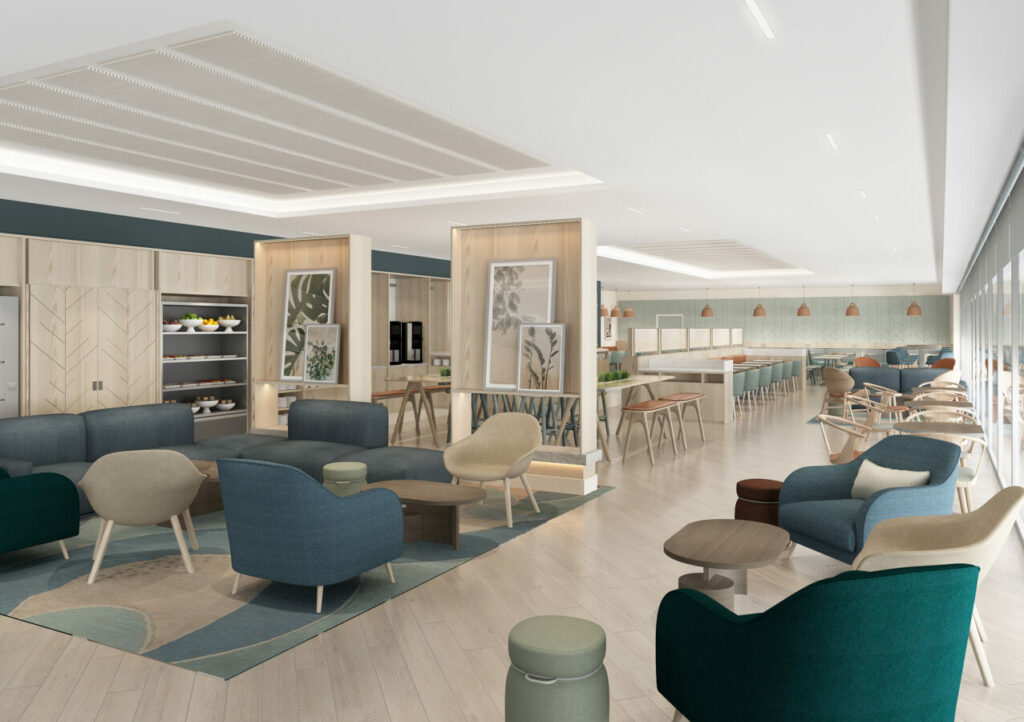
Best Practice
Recommendations for FF&E Procurement in Saudi Arabia
Successful hotel FF&E Procurement in Saudi Arabia is driven by 5 key considerations:
1. Strategic Supplier Relationships:
Work with an FF&E procurement firm that has well-established and strong relationships with both national and international suppliers. Strategic partnerships lead to better terms and improved collaboration.
2. Quality Assurance Programs:
Ensure that your FF&E Procurement partner has a comprehensive set of QA programs that they apply uniformly to both local and international suppliers, ensuring consistency in the quality of FF&E items procured.
3. Cultural Integration in Design:
Encourage your FF&E Procurement firm and their international suppliers to incorporate local design elements into their products, promoting a culturally coherent guest experience.
4. Sustainable Procurement Practices:
Ensure that your FF&E Procurement firm aligns its procurement practices with the sustainability goals of Saudi Vision 2030 by prioritising suppliers that demonstrate eco-friendly production processes and materials.
5. Risk Management Strategies:
Work with an FF&E procurement firm that implements robust risk management strategies and has experience mitigating the challenges of working with a diverse supply base, including contingency planning for supply chain disruptions.
In summary, the recommended best practice for successful hotel FF&E procurement in Saudi Arabia is to develop a hybrid sourcing model that fuses the local market’s knowledge, richness and cultural nuances with the global market’s breadth of brands, innovation and specialisation.
This dual-faceted approach will deliver hotel, leisure & hospitality spaces that are both internationally appealing and uniquely Saudi – while also contributing to the nation’s broader economic and social development goals.
Your FF&E Procurement Partner
At OCCA, we’ve procured FF&E for over 20 years across select-service and 5* resort hotels and luxury residential projects internationally – we know what a successful project looks like for you.
Thanks to our global network of over 500 suppliers, our financial expertise, and our real-time reporting and accounting, we ensure your FF&E is of the highest standard to suit your budget and desired ROI on your capex.
More than that, we partner with you through every step of the project from the earliest feasibility studies and budgeting, to overseeing delivery and installation – making the journey from concept to reality as seamless and exciting as possible for you.

